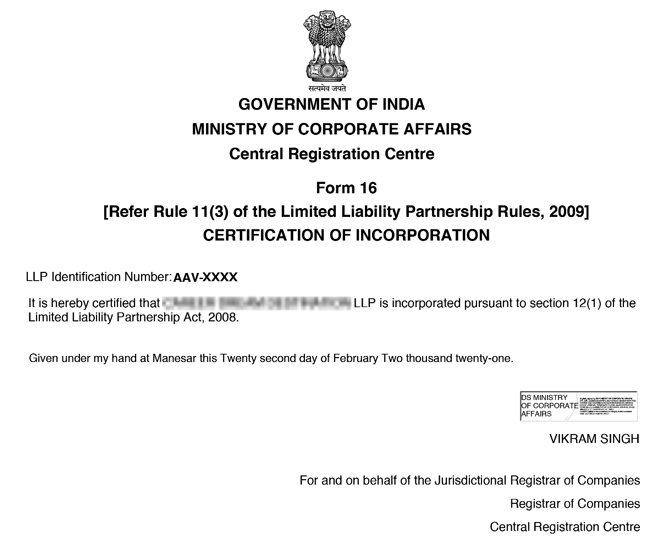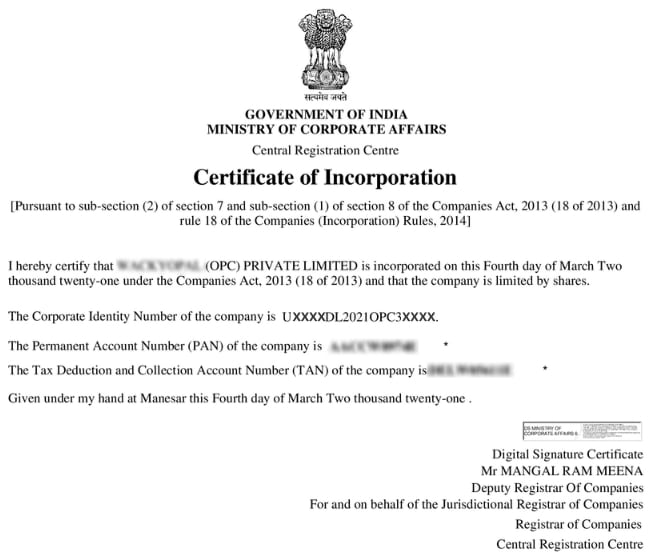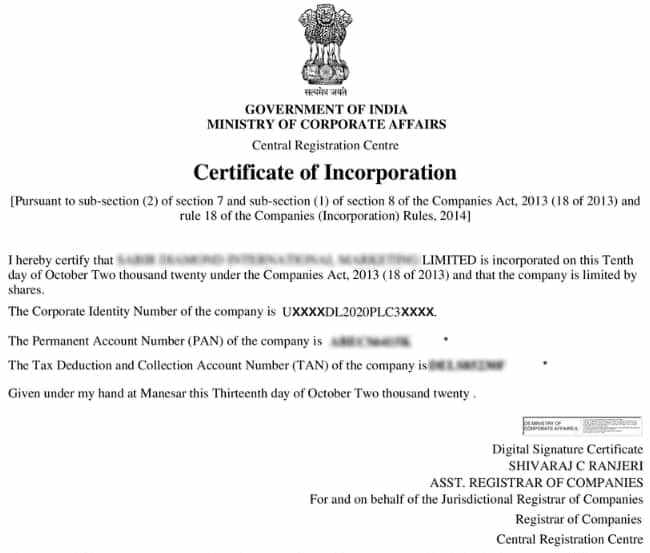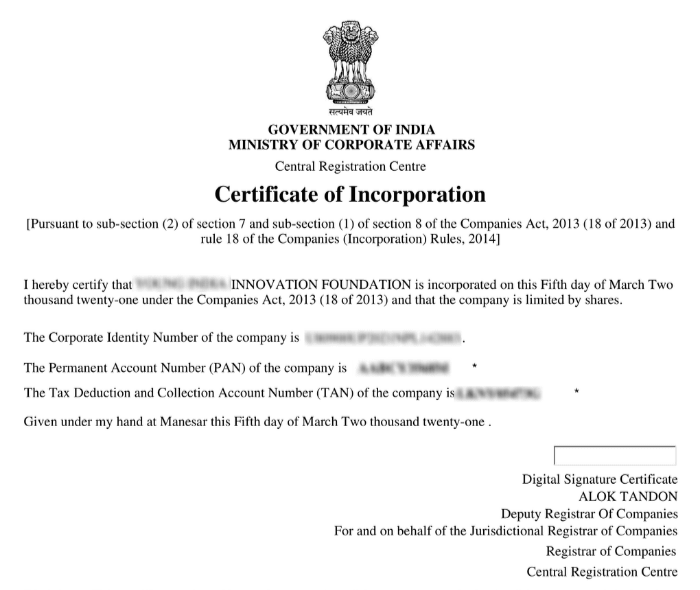Updated on October 14, 2025 03:15:29 PM
Establishing a business starts with a vital step—company registration. This involves the lawful registration of the business with the relevant government departments, providing it with a clear-cut legal identity. Company registration has a variety of advantages that include limited liability coverage, legality, credibility, and the availability of funding sources. Regardless of whether you're an individual business owner, a partnership firm, or a small business expanding, the correct business framework plays a vital part in long-term business success.
Company registration in India is regulated and overseen by the Ministry of Corporate Affairs and the Companies Act of 2013. The companies can be registered either as a Public Limited Company, a Private Limited Company, One Person Company (OPC), Section 8 Company (non-profit), or a Limited Liability Partnership (LLP). The forms of the company have different compliances, tax incentives, and models of operation.
Company Registration Certificate [Sample]





Company registration is the process of incorporation of a business entity in India under the Companies Act, 2013. A company is a separate legal entity from its shareholders and directors and it can sue or be sued. it has its own liabilities, assets and operations.
A company is registered through the office of the Registrar of Companies (ROC). It is a long legal process involving the various offices and The Ministry.
These are the different types of company registration or business structures under the Companies Act 2013. Each type has its necessity depending on the activities of the business.
A private limited company is a distinct legal entity from its owners, which offers the benefits of limited liabilities to its stakeholders and directors. It can have a minimum of 2 members and a maximum of 200 members. Each member of a company is considered an employee of the company. Private limited company registration is India's most preferred way to incorporate an entity.
A public limited company is an association of 7 or more members; it must also have at least 3 directors per the rules. The public limited company is incorporated under the companies act 2013. They offer their shares to the general populace; hence their stocks can be bought by anybody, and the liabilities of their stakeholders are limited to the stocks they hold.
Limited Liability Partnership (LLP) is a company registered under the ministry of corporate affairs (MCA) companies act. LLP is an Enhanced form of partnership Firm with the advantages of private limited companies where each partner is liable for the amount they have put into the company and shall not be responsible for the misconduct of one another. A minimum of 2 partners are required for LLP company registration. However, there is no limit to the maximum number of partners for an LLP.
One-person company (OPC) is a new concept introduced by the government under the companies act in 2013. OPC are similar to a private limited and also enjoys limited liabilities of a Pvt. limited company, but only a single person is required for one person company registration who also acts as both director and stakeholder of the company.
A company is attributed as a Section-8 company when the company is registered as a non-profit organisation. It is India's most prominent form of NGO registration under the Companies Act 2013. The purpose of section-8 NGOs is to promote culture, art, education, charity, and sports. The section-8 company can be incorporated as a Pvt limited company and a public limited company.
Nidhi company is considered a Non-banking financial sector company which works on the principle of mutual benefit and does not require RBI approval for company registration. It is founded to borrow and lend money from and among its members. The company must incorporate “Nidhi Limited” with its name.
Incorporating a company has its following benefits, which can help in the growth of the business.
Registering a company in india is now completely online through the Ministry of Corporate Affairs (MCA) portal. Whether you are starting a Private Limited Company, LLP, or One Person Company, the process remains the same. Below is a simple 4-step process:

The following documents are required for online company registration in India.
Documents of Directors and stakeholders.
Identity and Address proof of director as follows:-
For the proof of the registered office, the following documents are required.
The cost of company registration in India differs according to the chosen business structure and other associated charges. The table below presents indicative starting fees for various company types to assist in informed decision-making.
| Company Type | Government Fee | Remarks |
|---|---|---|
| Sole Proprietorship | Rs. 2,999/- | Simplest business form with minimal cost and compliance. |
| Limited Liability Partnership (LLP) | Rs. 8,499/- | Offers limited liability with moderate compliance. |
| Private Limited Company | Rs. 9,499/- | Preferred structure for startups and SMEs. |
| One Person Company (OPC) | Rs. 9,499/- | Suitable for sole entrepreneurs with limited liability. |
| Section-8 Company | Rs. 9,499/- | Established for non-profit and social initiatives. |
| Partnership Firm | Rs. 11,999/- | Easy to form but involves unlimited liability. |
| Public Limited Company | Rs. 16,699/- | Designed for large-scale operations with public funding. |
| Nidhi Company | Rs. 20,199/- | Regulated company for financial mutual benefit purposes. |
| Producer Company | Rs. 24,999/- | A hybrid entity combining cooperative and private company features. |
NOTE: The aforementioned Fees is exclusive of GST & The registration fee can vary State to State
Comparison Between Different Types of Business Structure
| Company Type | Ideal for | Taxation | Compliances | Benefits |
|---|---|---|---|---|
| Private Limited company | Start-Ups and small businesses | Lower tax rate and tax relief for 3 years under start-up India scheme | Initiation of business must be done within 180 days of incorporation, Mandatory annual return filing | 100% FDI is allowed |
| Public Limited Company | Business with high annual turnover | 30% annual tax charges on the total turnover of the company | Annual submission of accounts with RoC, mandatory return filing | Stocks can be bought by anybody |
| Limited Liability Partnership | For MSME’s and individual partners | Tax benefit on depreciation | Statement of Solvency by 3oth -OCT each year Annual return by 30th May every financial year |
No minimum capital is required |
| One Person Company | For individual start-ups and innovators | Tax relief for 3 years under start-up India | Must appoint an auditor within 15-days of company registration The mandatory annual return must be filed |
Requires only one person to set up a company |
| Section-8 Company | For NGOs and social cause | 100% Tax exemption if registered under section 12AA | Financial statement to be filed with RoC annually. An annual return must be filed. | High credibility among donors |

Conclusion
Furthermore, company registration involves several processes. Before registering a business, one must determine the organization of the business, i.e. whether the company should register as an OPC, LLP, PLC or Public Limited Company. Once the company has decided on its corporate structure, the name of the business is to be determined and directors of the company require DIN and DSC before applying for company registration.
After choosing the company's name and after obtaining DIN & DSC the company registration form has to be submitted to the MCA portal. This SPICe+ application, i.e., the company registration form, has to be filled in, and all necessary documents have to be uploaded online through the MCA portal, along with the fees prescribed. After confirming the SPICe+ form and the required documents, the ROC will issue the certificate of incorporation for the company. The incorporation certificate serves as evidence of the registration of the company. The company is now an independent legal entity.
At Professional Utilities, we leverage our industry knowledge and expertise to help businesses navigate complex regulations, minimize risks, and optimize operations for maximum efficiency and profitability.






"Explore how Professional Utilities have helped businesses reach new heights as their trusted partner."

It was a great experience working with Professional Utilities. They have provided the smoothly. It shows the amount of confidence they are having in their field of work.

Atish Singh
It was professional and friendly experience quick response and remarkable assistance. I loved PU service for section 8 company registration for our Vidyadhare Foundation.

Ravi Kumar
I needed a material safety data sheet for my product and they got it delivered in just 3 days. I am very happy with their professional and timely service. Trust me you can count on them.

Ananya Sharma
Great & helpful support by everyone. I got response & support whenever I called to your system. Heartly thanx for Great & Super Service. Have a Great & Bright future of team & your company.

Prashant Agawekar
Thank you so much Professional Utilities team for their wonderful help. I really appreciate your efforts in getting start business. Pvt Ltd company registration was smooth yet quick.

Abhishek Kumar
I applied for Drug licence and company registration and their follow-up for work and regular updates helped me a lot. They are happily available for any kind of business consultancy.

Vidushi Saini
Great experience went to get my ITR done, process was quite convenient and fast. Had a few queries, am happy about the fact those people explained me all things I wanted to know.

Taniya Garyali
Great services provided by Professional Utilities. They are best in this industry and the best part is their prices are so affordable. Kudos to you. Now you guys are my full-time consultant.

Aftab Alam
Director's identification proof such as Aadhar, PAN Card, and passport is required along with address proof of the company such as electricity bill, and phone bill which should be older than 2 months.
The minimum number of directors depends upon the business structure of a company. In the case of one person company (OPC), the sole person is responsible for all the company's activities. Ideally, 2 directors are mandatory except for the public company where 3 directors are required.
Before registering your company under start-up India, you must incorporate your business under the companies act 2013. Only after that, you can apply for DPIIT recognition to get start-up India benefits.
For the approval of the name concerned company needs to file E-form1 A with the concerned registrar of companies along with a fee of Rs. 500.
Company registration is subjective to what kind of business a company wants to carry; each business structure has its benefits and disadvantages. For instance, if only one person wants to start a business, then one person company registration would be preferable for a start-up.
| Private limited company | Limited Liability Partnership (LLP) |
|---|---|
| The maximum number of members shall not be more than 200 | No limit on the maximum number of members |
| The company name should end with Pvt. Ltd | The name should end with LLP |
| Can transfer shares easily. | Can transfer shares by executing an agreement before a public notary. |
Speak Directly to our Expert Today

Reliable

Affordable

Assured
Industries Served by
Professional Utilities
Apparels
Footwear
Furniture
Gems and Jewellery
Tourism & Hospitality
Consumer Electronics
Chemicals
Telecom
Oils & Gas
Hotel
Railways
Liquor
Health & Medical
Food Processing
Dangerous/ Haz. Goods
Tea & Coffee
Capital Goods
Recycling
Rubber
NGOs
Silk
Handloom
IT & BPM
Steel
Automobile
Tobacco
Constructions
Online Company Registration in Other States